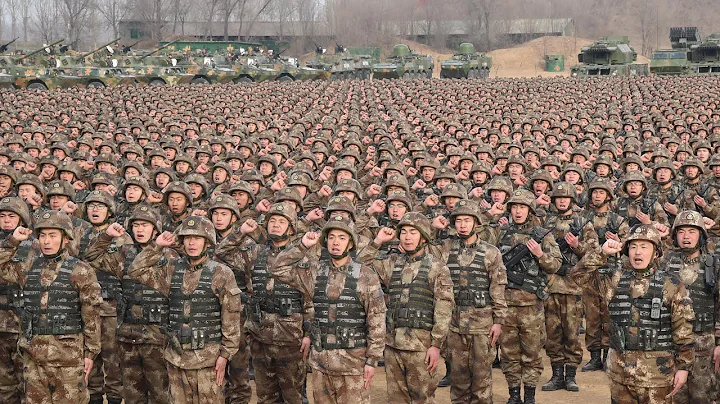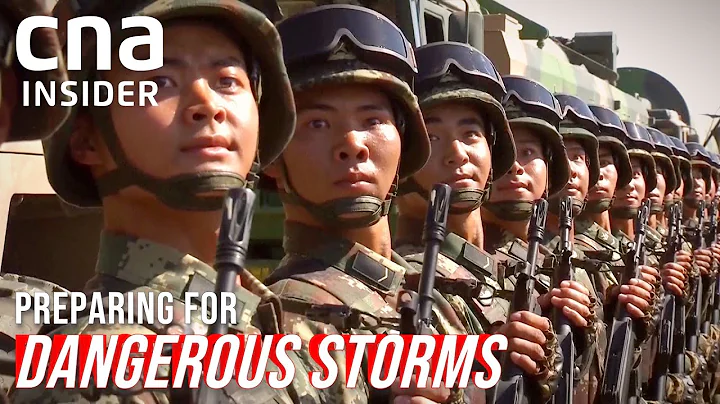
Zhou Enlai
The first film reflecting the "suppression of bandits"
On August 29, 1949, after the 144th Division of the 48th Army of the Fourth Field Army of the Chinese People's Liberation Army liberated Ningdu in Jiangxi Province, it was ordered to encircle and annihilate the enemies in Cuiweifeng northwest of Ningdu. Cuiweifeng The road is rugged and easy to defend but difficult to attack. About 2,000 Kuomintang armed men, led by Huang Zhenzhong, the former commander of the Yuzhang Mountain Appeasement District, occupied the mountain, built strong fortifications, and moved power plants, repair shop equipment and large quantities of grain into caves in an attempt to take advantage of the danger and resist.
htmlOn August 30, the 144th Division of the People's Liberation Army completed its encirclement deployment. The 428th Regiment of the Division stormed Chaoyang Mountain and wiped out the stubborn enemy after an hour of fighting.
By September 19, all the peripheral strongholds of Cuiweifeng were captured, and the remaining enemies were compressed on several isolated peaks such as Cuiweifeng.
html At 6:30 on September 23, the division, with the support of the Junshan Artillery Battalion and the War Defense Artillery Battalion, launched a general attack on the enemy's core stronghold. By 3 p.m., Huang Zhenzhong was forced to surrender with his remaining troops.
A total of more than 1,960 enemies were wiped out in this battle, which was hailed by the Central China Military Region as an example of tough battles in the "bandit suppression" campaign.

Cuiweifeng
After the founding of New China, Shanghai Film Studio wrote this battle example into a script and filmed it into the film "Cuigang Red Flag".
This is the first film shot after the founding of New China to reflect our army's "bandit suppression" operations.
The filming of "Red Flag at Cuigang" brought together artists from the liberated areas and those who originally lived in old Shanghai. Starring Yu Lan and assistant director Ma Yu are revolutionary literary and art workers trained by Yan'an Luyi. Director Zhang Junxiang, photographer Feng Sizhi, and Zhang Fa who played Jiang Mengzi, Xiao Zhenkui, Feng Laosi, Feng Zhigu , Chen Tianguo, Xia Xia, Bai Mu, etc. have been engaged in film work in Shanghai since the 1930s and 1940s.
Due to the recommendation of screenwriter Du Tan, Yu Lan, who had just become famous (filmed the film " White Warrior "), was determined to play Xiang Wuer.

"Cuigang Red Flag"
Go deep into the Soviet area and truly experience life
For Yu Lan, more preparation work is to visit and contact the families of the Red Army , as well as surviving cadres and party members, to understand how they overcame difficulties while staying in the Soviet area. Survive all kinds of hardships.
Yu Lan was eager to interview about thirty or forty people in just one month, from the secretary of the provincial party committee to ordinary people.
Every interviewee spoke eloquently and burst into tears, describing how the party organization was severely damaged after the Red Army went north to fight against Japan. The enemy was extremely brutal at that time.
For 15 years, countless relatives have been separated and have no news, but they have never forgotten the Communist Party of China.
The 59-year-old old man surnamed Zhong and his wife were beaten to death by the enemy. He thought that the Kuomintang would always be "lost" and we would always turn around, so he took off the notice of the Kuomintang joint security director and hid it in the house. On the floor, they were waiting for the Communists to come back and seek blood repayment.
It was the belief that the revolution would win deep in the hearts of the people in the Soviet area that the Party had sown, which enabled them to withstand the most arduous hardships under the white terror. This is also the true historical background of the film "Red Flag in Cuigang".
Yu Lan gained the most and was also greatly shocked to come into contact with many people similar to what Xiang Wuer encountered.

Yu Lan
A woman named Kuxiang has been doing women's work since 1929. When the Red Army left in 1934, she had served as the Propaganda Minister of the County Party Committee of Ningdu and Xingguo. However, she stayed due to illness. Later she went to Dafoshan to continue the struggle. , the enemy burned the mountains on all sides, and she ran out of ammunition and food before being caught.
The enemy division commander and regimental commander asked her to let her out if she agreed to become his concubine. She firmly refused and said, "If you don't let me go home, I will not be sentenced to death." The guards sent her to Nanchang and imprisoned her. In September, he was sentenced to twelve years in prison.
Her mother sold cattle and borrowed money, and finally raised 70 yuan, bought the detention center, and bailed her out. Kuxiang worked as a nanny in the landlord's house for two years.
Later, the Kuomintang forced her to join the support committee. She hid in the mountains and married a nonpartisan administrator who was digging tungsten mines there. After many hardships, she finally borrowed money to start a small business to make a living.
She said she believed the party would definitely come back. When I saw the leader of the army during the liberation, I felt so bitter and happy that I couldn't even speak.

Stills of "Cuigang Red Flag"
Chairman Mao and Premier Zhou gave affirmation
It should be said that among the films with the theme of revolutionary struggle, "Cuigang Red Flag" is unique. Its protagonists are not all-powerful heroes like Liu Hulan and Zhao Yiman, but Xiang Wuer, a Red Army family member who still maintains his integrity when the revolution is at a low ebb.
What the film focuses on is not the life-and-death fight between the enemy and ourselves, but the side of Xiang Wuer's life who firmly waits for her husband in adversity and raises her children as revolutionary offspring. This is the success and uniqueness of the film. at.
Not long after the film was released, it was well received. Many generals who had gone north from the Soviet area on the Long March were moved by the scene and burst into tears after watching the film.
However, the film also attracted many sharp criticisms. The main criticism was that the film did not show the party's leadership of the people after the Red Army went north. In particular, the protagonist Xiang Wuer lacked "typicality" and was a "waiting person" ( "Victorious" female image" rather than "a hero with a fighting character".
After these inappropriate comments were published in major newspapers and magazines in Shanghai, they attracted the attention of Zhou Enlai. He specifically pointed out:
"The film "Cuigang Red Flag" moved people very much, and some parts made people cry. Xiang Wu'er in How could he not be a heroic figure when the white terror was so serious, still standing firm and waiting for the return of the Red Army? "
He also said to the film's starring Yu Lan: "Chairman Mao and I watched it twice, and the chairman was very happy. He praised it and told the cadres not to forget the people of the old Soviet area. "
Due to its outstanding visual effects, the film won the Photography Award at the 1951 Sixth Karlovy Farley International Film Festival. Later, the film won the second prize for Outstanding Feature Film from 1949 to 1955 issued by the Ministry of Culture, and each of the main creative staff received a medal for this.

Stills of "Red Flag at Cuigang"
In 1953, Premier Zhou Enlai once gave a report at Huairen Hall in Zhongnanhai. When he talked about the feature film "Red Flag" shot in my country, he, who is usually easy to calm down, severely criticized the leaders of the film department at that time.
It turns out that not long ago, our country’s film delegation took this film to an Eastern European country to participate in an international film festival. When it was screened, it caused a strong response. The judges composed of many countries almost unanimously selected "Cuigang Red Flag".
However, what is puzzling is that the leader of our delegation insisted on not accepting this award and repeatedly explained to others that this film did not deserve to win the grand prize.
The judges from various countries could not understand the attitude of our delegation. When Zhou Enlai heard about the whole process, he mentioned it sadly at this meeting and became really angry.
Zhou Enlai severely criticized that this was a national inferiority complex at work! He was so excited that he said loudly: "This does not look like a representative of the liberated people of New China!"

Zhou Enlai
Yue Ye, who attended the meeting at the time and sat in the left corner of the front row, remembered this scene deeply. He recalled: "In my memory, I have only seen him (Zhou Enlai) really angry and angry this time... I seemed to hear the angry waves rolling in his chest that could always hold a boat, and his lively and amiable face became extremely "Severe."
Zhou Enlai, who was very well-educated, did not get out of control. After he got angry, he immediately controlled himself and apologized sincerely: "Please forgive me for getting so angry. I, Zhou Enlai, am also a human being. There are also human feelings, seven emotions and six desires! "

Stills of "Cuigang Red Flag"





















